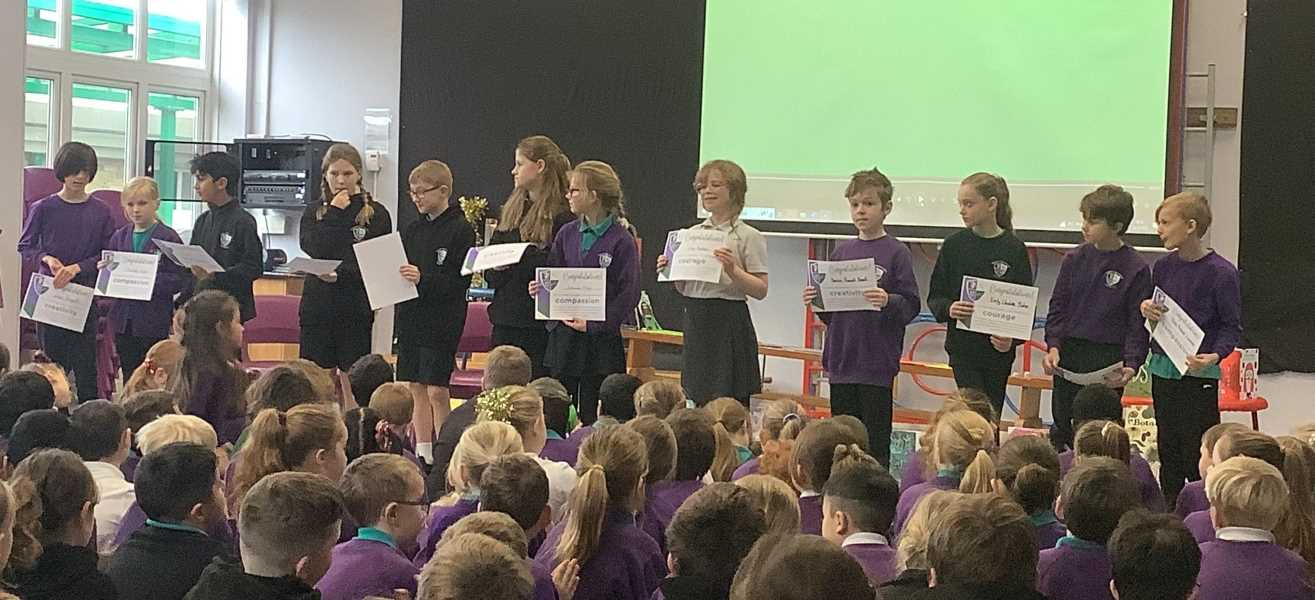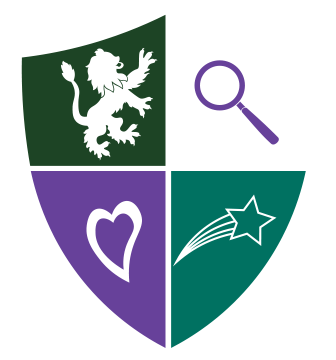Year 5 and 6
Welcome to Upper School
Our three classes are Amazon, Daintree and Redwood.
This term, the Spring Term 2024, our topic is True Tribes. We are learning about prehistoric Britain, and how the people on this island lived in times very different from our own throughout the Stone Age, Bronze Age and Iron Age.
The adults working in our phase are:
Amazon - Miss Edwards-King (class teacher) 
Daintree - Miss Hannah (class teacher) 
Redwood - Mr Edwards (class teacher) 
Each term, the classes vote for members of their class who have shown particular courage, curiosity, compassion and creativity. Here are the elected certificate winners from Years 5 and 6 at the end of the Autumn Term 2023:

Our teaching assistants are:
Ms Bassett, Mrs Jacobs, Mrs Jersysnka, Mrs Welsh, Mrs Abbott
Survival! (Upper School Summer 2024)
Over this term, the children will ponder big questions – ‘What does it take to survive?’, ‘Is it acceptable to do anything to survive?’. The topic will be launched with our ‘Operation Moonbase’ day – with the children considering what people in a new society would need in order to survive – what skills, knowledge, and resources would be essential?
Children will begin by learning about mountains (including how they are formed, their key features, and the location of important mountain ranges around the world). They will then consider the impact mountainous climates and environments can have on local people and economies, and their survival. Learning about pulleys and gear systems in DT will enable children to design and construct mechanical systems that could support a mountain business (e.g. raising supplies up and down a steep face). In art the children will study botanical drawing before developing their own close observations of plants and flowers, culminating in their own presentations of poisonous and friendly plants. They will also practise using one point perspective in creating an atmospheric jungle scene complete with jungle style fauna!
In history, the children will study the Ancient Maya – focusing on their daily life, culture and religion, and what it took to survive in Mayan society. They will consider the influence that living in a mountainous region had on aspects of their lives.
Learning about life cycles and how they differ between species will support children to consider what animals need in their habitats to survive – and they will engage in fieldwork around the site to examine the different animal habitats in our school grounds.
Eco-curriculum learning this term will focus on growing more food (leafy crops that can be used in a salad – spinach, leaf beet, lettuces etc). The children will develop their cooking for life skills by making a simple pasta sauce.
A visit to Cambridge Mosque will support children’s learning about Islam begun in the Spring term, and help the children to understand the concept of a prophet. In other worldview sessions the children will consider the big question ‘How should we treat each other?’ and compare the views of people with different faiths and beliefs.
The topic will come to a close with an evening camp out where the children will build their own shelters using their Forest School experiences in the Spring term, cook food and drinks over the fire and play survival themed games!
Spring Term 2024:
This topic will be launched with a tribal campfire event in the Forest School. The children will enjoy a fire event and come up with their own Upper School chant! They will use this event to consider why and how humans might have learned to use fire, and the benefits that would have brought. They will find out what happened to the Tollund Man through a motivating detective investigation! Researching an existing tribe through reading ‘The Allure of the Uncontacted – the North Sentinel Islanders’ will spark discussion about uncontacted peoples, and the ethical debate around whether ‘modern life’ is better.
Over the term the children will be learning about the beginnings of human civilisation in Britain, and how human society developed. They will study the changes in how humans lived in Britain from the Stone Age to the Iron Age, including their art, and develop their understanding of chronology by noting contemporaneous events around the world. A visit to the amazing Celtic Harmony Camp will consolidate and bring their learning to life.
Children will deepen their understanding of Islam, in preparation for a visit to Cambridge Mosque later in the year. They will also explore Humanism and consider how it differs from religious faiths that they have studied in KS2.
In art, children will relate how early humans made their mark on the world to their learning - designing and making their own lino print. They will think about what mark they would like to make on the world, and represent this in their design. Learning new skills of lino printing including cutting away more material in order to add a second colour will require focus and concentration, as well as careful use of tools. This print will be added to a fabric gift bag – which is the focus of design in DT.
Considering how rivers make their mark on the landscapes through which they travel will be the focus of children’s learning in Geography. Linking to their previous learning about settlements, children will reflect on the importance of rivers to settlements in Britain over time. Over the term Upper School will continue their care of the environment through surveying invertebrates, helping to maintain the pond environment, and tending the allotment (including starting some tender plants indoors ready for planting out).
The topic may draw to a close with a celebration of learning - ‘Making our Mark’ – where families will be invited to enjoy the fruits of children’s labours in the kitchen where they will have created savoury baked snacks, and the children will display their print work, music, and learning about rivers.
Autumn Term 2023:
Over this term, the children will be immersed in the history of Britain during the Second World War – beginning with our trip to the RAF museum. They will learn about the Home Front and the experiences of evacuees, and learn what life was like for families, as well as considering the changing role of women over the course of the war. They will link their learning about evacuees to the relevant Rights in the UNCRC. They will consider the Battle of Britain and debate its significance as a turning point in WWII. They will consider how Britain and its people displayed resilience at different points in the war, and how this supported the war effort – and think about the quality of resilience as a positive trait.
Through their work with a range of sources, and their learning in art, the children will learn about censorship and propaganda – their role in the war, and consider whether either plays a role in life today. Children’s learning in PSHE ‘Working Together’ and continued work on Zones of Regulation will lead them to reflect further on being resilient, what that means, and how developing resilience can support them in many ways.
Through their learning about migration and refugees in Geography, children will draw comparisons between different types of migration, the experiences of evacuees and displaced people during WWII, and the experiences of refugees and migrants today. They will consider the push/pull factors for migration, and the levels of persistence and resilience that some migrants/refugees demonstrate – and why this might be the case.
As the term progresses, children will prepare for Remembrance Day, finding out about where local armed forces members used to live in the village and employing their OS map skills to find their homes. They will participate in the school’s Remembrance activities, and be invited to join the community on Remembrance Sunday – some of them reading the names of the fallen from the First and Second World Wars.
In science and DT, the children will further develop their understanding of light, electricity, complex circuits and nets – and construct their own model Anderson Shelters with alarm systems. They will include evaluation criteria that link to their learning about the Blitz. They will prepare the school site for winter – supporting animal and plant life to thrive in the colder weather, and planting overwintering greens.
The topic will come to a close before Christmas with a special festive event that supports children to reflect on and exhibit what they have learnt over the term.
